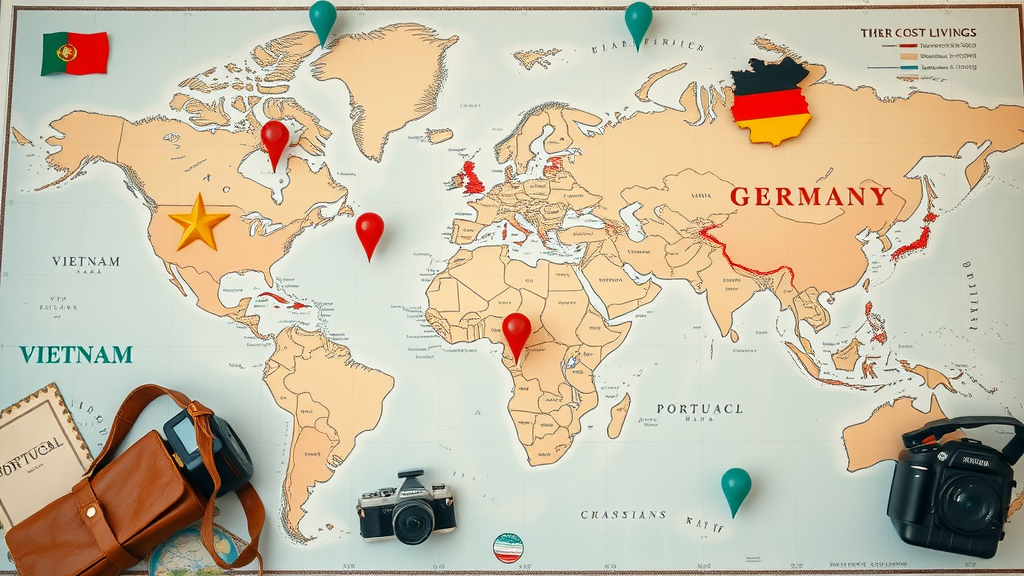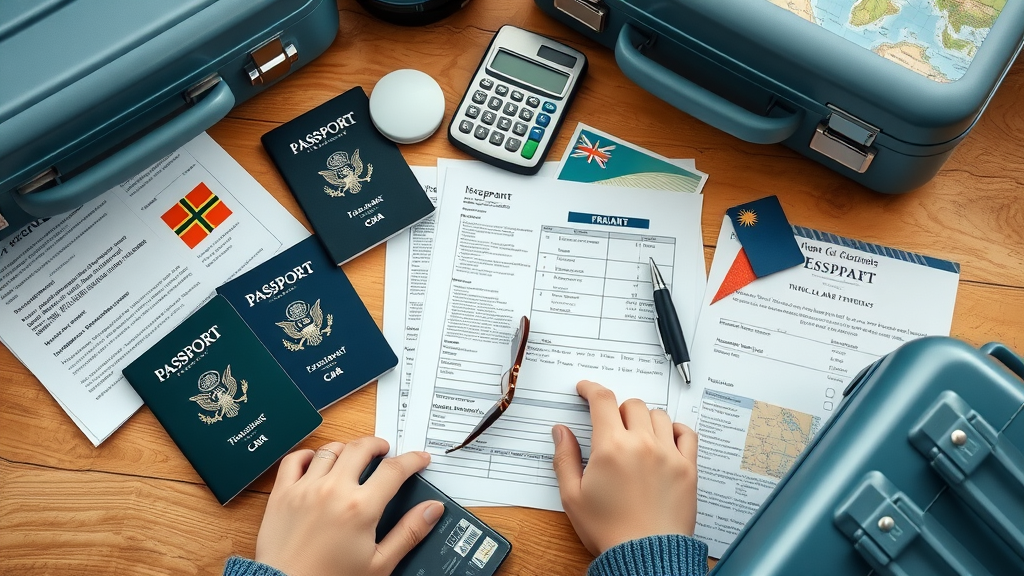"Over 280 million people live outside their home country today—embracing expat life is more common, and more achievable, than ever before."

Understanding Expat Living Tips: Why Preparation Sets You Up for Success
- How expat living tips can ease your transition
- Practical advice for moving abroad and navigating expat life
- Common pitfalls for expats and how to avoid them
Deciding to move abroad is one of the most significant and rewarding decisions you can make in your life. Yet, the success of your expat journey hinges on meticulous preparation. Expat living tips serve as your compass, providing actionable guidance to handle everything from legal paperwork to managing your finances, integrating into expat communities, and coping with the nuances of life abroad. With proper planning, you can ensure the process isn’t just smooth, but empowering, as you discover a broader world and new cultures with confidence.
Many newcomers underestimate the challenge of adjusting to a foreign country. Moving without understanding essential requirements—like your work permit, health insurance, or how to open a bank account—can quickly lead to stress and unnecessary pitfalls. By following proven insights from experienced expats, you’ll not only avoid common missteps but set yourself up to embrace the adventure with open eyes and a practical mindset. Whether you plan to stay for months or make a permanent move, proactive preparation is the key to a positive, transformative expat life experience.
Comprehensive Expat Living Tips for Every Stage of Your Journey
Researching Destinations: Evaluating Cost of Living and Quality of Life
| Country | Cost of Living Index | Quality of Life Ranking | Recommended for Expats |
|---|---|---|---|
| Portugal | 53.89 | 8/10 | Yes |
| Vietnam | 39.85 | 7/10 | Yes |
| Germany | 65.26 | 9/10 | Yes |

The first step towards life abroad begins with researching your destination country. Weighing the cost of living and overall quality of life is crucial for making a sound decision that suits your lifestyle and financial plans. Countries like Portugal often make it easier to transition, offering high scores for expatriate satisfaction, affordable living, and strong support structures. Meanwhile, Vietnam has gained popularity among digital nomads and budget-conscious expats, while Germany attracts those seeking robust infrastructure and excellent public services.
Evaluate not just the numbers but also the intangibles: safety, climate, healthcare quality, accessibility, and local culture. Is there a thriving community of fellow expats? How is the political stability? Are there straightforward processes for securing a work permit or nomad visa? These factors contribute significantly to your potential quality of life and can either make or break your move abroad. Always compare multiple sources and reach out to current residents via social media or expat forums to get firsthand insights. By making informed choices early, you save yourself challenges down the road.
Preparing for the Move Abroad: Financial and Legal Essentials
- Securing a work permit or visa
- Opening a local or international bank account
- Obtaining comprehensive health insurance for living abroad
- Managing your finances before and after you move

Before you can relish your new expat life, you need to navigate the important groundwork—acquiring a work permit, arranging your finances, and understanding local laws. Depending on your host country, the visa process might differ. Applying for a work visa or a digital nomad visa may require proof of income, job offers, or other supporting documents. It’s important to understand all deadlines and eligibility criteria ahead of time to avoid delays or legal headaches.
Financial preparation is equally vital. Opening a bank account in your new country simplifies transactions, while an international bank account may reduce hidden fees from currency exchanges. Don’t forget to review your current insurance coverage and secure international health insurance if needed. Budgeting for the early months after you move helps you cope with initial expenses and prevents unexpected surprises. Leveraging budgeting tools and consulting with a tax consultant about expat tax obligations ensures compliance with both your home country and host country laws.
Dealing with Culture Shock and Adapting to Life Abroad
- Top strategies for overcoming culture shock
- Learning the local language quickly
- Navigating social customs and etiquette
"The biggest challenge expats face isn’t language—it’s adapting to a new set of unspoken social cues."
Culture shock is a universal experience for anyone moving abroad. It often manifests as a mix of excitement, confusion, and sometimes frustration—especially as you adapt to different social norms, language barriers, and daily routines. To minimize its impact, actively learn about social expectations in your destination: observe locals, ask respectful questions, and recognize that even simple actions, like greetings or body language, may have different meanings.
Learning the local language is another game-changer in your adaptation process. Even basic proficiency can break down barriers and foster meaningful connections, significantly boosting your sense of belonging. Remember, most newcomers feel overwhelmed in the first weeks, so be patient and celebrate your progress. Embracing local customs and participating in community events also help bridge cultural divides, turning initial discomfort into an enriching part of your expat life.
Building Your Network: Expat Communities and Support Systems
Finding and Joining Expat Communities
- Benefits of connecting with expat communities
- Tools to find expat events, both online and offline
- How digital nomads use social media to build support networks

Tapping into expat communities is essential for emotional support and practical advice, especially in your initial months abroad. Fellow expats can offer tips on legal processes, share recommendations for services, and provide a welcoming social circle to ease feelings of isolation. Additionally, digital platforms have opened new opportunities for both newcomers and seasoned digital nomads to connect, share experiences, and attend local events.
Seek out community gatherings, language exchanges, and special-interest groups through social media pages, apps, or word of mouth. Virtual forums and curated Facebook groups make it easier than ever to ask questions and get immediate, relevant answers. For those working remotely or seeking flexibility, digital nomads have mastered network-building via LinkedIn, Instagram, and Slack channels, cultivating a sense of community across borders and time zones. Remember, being open and proactive is all it takes to make your relocation more enjoyable and fulfilling.
Maintaining Relationships Back Home and Integrating Locally
- Balancing relationships with family members back home
- Best practices for making local friends
- Staying connected through technology and travel
One challenge of living abroad is managing relationships both with people back home and in your new environment. Maintaining regular communication with family members and friends is important—schedule video calls, share updates, and plan occasional visits to preserve strong bonds. Sharing your new experiences helps loved ones understand your journey and can alleviate homesickness.
At the same time, meaningful integration into your host community is vital for personal happiness and mental well-being. Start by striking up conversations with local colleagues, neighbors, or at community events. Involvement in local volunteer opportunities and clubs is a great way to learn cultural norms and build friendships beyond the expat bubble. Leveraging digital tools like WhatsApp and WeChat ensures you stay connected worldwide, making the transition between your past and present worlds smoother.
Work, Money, and Stability: Financial Expat Living Tips
Work Permit and Career Opportunities for Expats and Digital Nomads
- Navigating work permits and legal requirements
- Popular jobs for expats and digital nomads
- Remote work, freelancing, and international careers

Gaining legal permission to work in your destination country is a critical step in relocating. The work permit process varies widely, so start the application long before you move abroad. For some, a nomad visa or digital nomad program can simplify the legal requirements, opening doors for remote work, freelancing, or gig economy roles. In-demand jobs for expats often include English teaching, IT, tourism, and healthcare, but remote careers in marketing, consulting, and software development continue to grow.
If you’re already established in a virtual career, make sure you update your clients, register your business if necessary, and research taxation in both your home country and host country. Expat tax compliance and double taxation treaties are important to understand, and working with an experienced accountant can be a wise investment. The freedom of a digital nomad lifestyle comes with its own set of challenges but also unique opportunities in today’s global workforce.
Setting Up Your Finances: Budgeting, Banking, and Planning
- How to open a bank account in your new country
- Simplifying currency exchange and avoiding hidden fees
- Manage your finances with budgeting apps and tools

Efficiently managing your finances is integral for a worry-free expat life. The first step is often to open a local bank account—this streamlines daily transactions, pays your rent, and helps with utility bills. Research banks catering to international customers, look for English-language banking services, and bring all required documentation (such as a residence permit, proof of address, and passport). Some expats may prefer international banks to keep funds in multiple currencies and avoid excessive conversion costs.
Harness technology to simplify your financial planning. Use budgeting apps that track expenses in multiple currencies and help you plan for recurring payments like rent or health insurance. International transfer services such as Wise or Revolut can save money on exchange rates and hidden fees. Paying by credit card may offer purchase protection and additional rewards, but check for foreign transaction fees. A proactive approach lets you enjoy life abroad without worrying about financial hiccups.
Health and Wellbeing: Staying Safe and Happy While Living Abroad
Securing Health Insurance and Managing Medical Care
- Why health insurance is vital for expats
- How to choose international health insurance plans
- Essential medical checklists before you move abroad

Comprehensive health insurance is a must for anyone seeking to thrive in a foreign country. Medical costs can vary dramatically, and your home policy may not offer coverage abroad. Many countries require proof of adequate health insurance for visas and residency permits, so research local regulations before you move abroad. Choose between international plans—great for those relocating often—and local policies tailored to your host country’s healthcare system.
Before you leave, schedule a check-up, ensure all vaccinations are up to date, and bring copies of prescriptions. Familiarize yourself with emergency numbers, local clinics, and how to access care in your new home. If you have ongoing medical needs, transfer records and refill essential medications. An organized approach to medical issues will offer peace of mind, allowing you to focus on new adventures.
Balancing the Challenges and Benefits of Expat Life
- Improving quality of life overseas
- Recognizing and managing expat syndrome
- Critical mental health resources for expats
"Thriving as an expat isn’t just about surviving—it’s about flourishing in a new environment."
Adjusting to life abroad comes with its highs and lows. On one hand, you might experience improved quality of life, new friendships, and personal growth. However, “expat syndrome”—characterized by loneliness, stress, and homesickness—can affect even the most seasoned travelers. Recognize early warning signs such as prolonged sadness or withdrawal, and don’t hesitate to reach out to mental health resources tailored to expats.
Building a balanced routine, pursuing hobbies, and leaning on expat support groups can make a world of difference. Consider local mental health professionals or online counseling if needed. Remember, the goal is not just to survive your new surroundings, but to truly embrace and flourish within them, enjoying all the transformational aspects of expat life.
Adjusting to Local Culture: Overcoming Language Barriers and Embracing Change
Mastering the Local Language for a Smoother Transition Abroad
- Top apps and programs for learning a new language
- How to practice language skills every day
- Benefits of bilingualism in expat life

Learning the local language is one of the most valuable expat living tips you can implement. Use popular language-learning apps such as Duolingo, Babbel, or Memrise to establish a foundation before you move. Once abroad, practice with locals—at coffee shops, markets, or through conversational meetups. Immersing yourself, even imperfectly, will accelerate your progress and deepen your sense of belonging.
The benefits of bilingualism stretch far beyond daily convenience. You’ll unlock richer travel experiences, better job opportunities, and a broader support network. Plus, you signal respect for your host culture, making both practical integration and emotional connection much easier. Even modest efforts to learn and use the local language can dramatically improve your quality of life abroad.
Embracing Local Customs to Reduce Culture Shock
- Celebrating local holidays and traditions
- Adapting your lifestyle to fit local norms
- Simple ways to become part of the community
Blending into a new community requires more than language proficiency—understanding and embracing local customs is just as important. Attend local holidays, festivals, and community events to observe traditions firsthand. Show enthusiasm for learning and don’t hesitate to ask questions; communities often appreciate outsiders’ genuine interest and effort. Being present at these gatherings not only relieves culture shock but creates opportunities for organic friendships.
Adapt your daily routine to fit local practices, whether that means adopting new meal times, modes of transportation, or even the rhythm of work and rest. Small gestures such as greeting shopkeepers or observing traditional etiquette go a long way. The more you immerse yourself, the sooner your new home will truly feel like home.
Essential Tech and Tools for Modern Expats and Digital Nomads
Using Social Media to Connect and Navigate Living Abroad
- Best social media platforms for expats
- Curated groups and pages for moving abroad tips
- Digital nomads: building online presence and community

Social media has revolutionized the way expats find support, build networks, and stay informed. Platforms like Facebook, Reddit, and Instagram feature groups dedicated to different destinations and expat communities. Groups offer practical advice on everything from finding housing and work to understanding visa procedures and local news.
For digital nomads, a strong online presence is both a professional asset and a means of connecting with likeminded individuals worldwide. LinkedIn enables job searches and business connections, while platforms like Nomad List curate resources and reviews on emerging expat hotspots. Regular engagement in these channels ensures you stay updated on essential expat living tips, transforming challenges into shared achievements.
Must-Have Apps for Expats and Digital Nomads
- Budgeting and finance management tools
- Translation and navigation apps
- Resources for finding expat communities
"Your smartphone is your passport to thriving expat life—don’t underestimate the power of digital resources."
Equipping yourself with the right apps makes your expat life more manageable and enjoyable. Essential downloads include budgeting tools (YNAB, Mint), translation apps (Google Translate, iTranslate), and navigation aids (Maps.me, Citymapper) to orient yourself and handle daily necessities. For networking, Meetup and Internations help you locate expat events and social gatherings.
Specialized resources like TransferWise for money transfers or Duolingo for language skills extend your digital toolkit. Don’t forget travel apps for flight tracking, accommodation, and public transportation. The right tech not only saves you time and money but also helps turn every destination into an opportunity, making each new chapter as an expat smooth and rewarding.
Long-Term Happiness: Safeguarding Your Expat Life Experience
Sustaining Work-Life Balance and Enjoying Your New Home
- Strategies to build a sustainable routine
- Maintaining hobbies and interests abroad
- Making the most of life abroad as a family member or solo expat

Creating a happy and sustainable expat life depends greatly on maintaining balance. Develop routines that blend work, self-care, and local exploration. Carve out time for physical activity, social interactions, and your favorite hobbies—even small activities like reading, gardening, or learning a new skill help establish a sense of normalcy.
If you are relocating as a family member, incorporate activities that connect the entire household to your new environment, such as cooking local dishes or participating in community events. For solo expats, be deliberate about expanding your social circle and prioritizing mental wellness. Ultimately, making time to enjoy your surroundings transforms the experience from merely “living abroad” to truly thriving abroad.
Planning for Returning Back Home or Moving Again
- Preparing for reverse culture shock
- Retaining expat connections after you return
- Planning your next move abroad
At some point, many expats face the decision to return back home or relocate again. Both transitions come with distinct emotional and practical challenges, especially the often-overlooked phenomenon of reverse culture shock. Prepare psychologically and logistically by setting realistic expectations, reconnecting with local culture, and sustaining relationships you made while abroad.
Keep expat friendships alive through social media, virtual gatherings, and—whenever possible—in-person reunions. If you plan to move abroad again, use the lessons and networks you’ve gathered for a smoother experience next time. Consider the pros and cons, compare new destinations, and reflect on your evolving goals to make every move more meaningful.
Frequently Asked Questions About Expat Living Tips
What is the easiest country to move to as an expat?
- Countries with simple visa processes: Portugal, Costa Rica, Vietnam
- Factors impacting ease of moving: language, cost of living, expat support
Portugal, Costa Rica, and Vietnam are often cited as the easiest countries to move abroad due to their streamlined visa processes, lower barriers to entry, and vibrant expat communities. Factors like local language accessibility, cost of living, supportive government policies, and strong networks for expats all play a role in making these destinations popular choices among newcomers.
What is expat syndrome?
- Definition of expat syndrome: emotional and psychological challenges
- How to identify and manage expat syndrome symptoms
Expat syndrome refers to the emotional and psychological strains that can arise from adjusting to life abroad. Symptoms can include homesickness, disorientation, anxiety, and culture fatigue. Recognizing early signs, maintaining routines, seeking out mental health support, and actively joining local communities are key strategies to managing and overcoming expat syndrome.
Where do the happiest expats live?
- Top-ranking countries: Switzerland, New Zealand, Canada
- What contributes to expat happiness abroad
According to surveys, expats report the highest satisfaction in Switzerland, New Zealand, and Canada. These destinations offer high standards of safety, healthcare, career opportunities, and genuinely welcoming cultures. Quality of life factors such as work-life balance, social inclusion, and plentiful outdoor activities contribute greatly to expat happiness.
What is a typical expat package?
- Overview of expat compensation and benefits: salary, housing, health insurance, allowances
- How to evaluate and negotiate an expat package
A typical expat package may include a competitive salary, housing allowance, relocation expenses, health insurance, schooling for dependents, and travel benefits. Always evaluate details based on your destination, personal circumstances, and career level. Don’t be afraid to negotiate terms such as home leave, repatriation assistance, or extra vacation days—these benefits can be just as vital as salary in supporting a successful relocation.
Key Takeaways for Embracing Expat Life and Moving Abroad Successfully
- Research thoroughly before your move abroad
- Join local and digital expat communities
- Manage your finances and health insurance proactively
- Stay adaptable and open-minded to thrive in your new home
Final Considerations for Thriving with These Expat Living Tips
Proactive planning, a thriving support network, and a flexible mindset are the cornerstones of a rewarding expat journey. Embrace change, keep learning, and your new adventure abroad will be a success.
Embarking on an expat journey is both exciting and challenging. To enhance your experience, consider these valuable resources:
-
“10 Tips for a Successful Expat Life: How to Thrive in a New Country” (allianzcare.com) offers practical advice on embracing cultural differences and prioritizing health and well-being, essential for a smooth transition.
-
“10 Important Tips for First-Time Expats” (expatica.com) provides insights into learning the local language and fostering independence, key factors in adapting to a new environment.
If you’re serious about thriving abroad, these resources will equip you with the strategies needed for a successful expat life.
 Add Row
Add Row  Add
Add 

Write A Comment